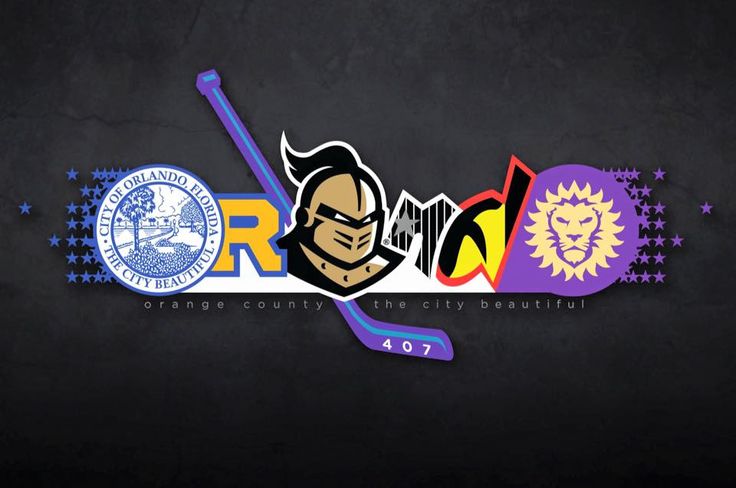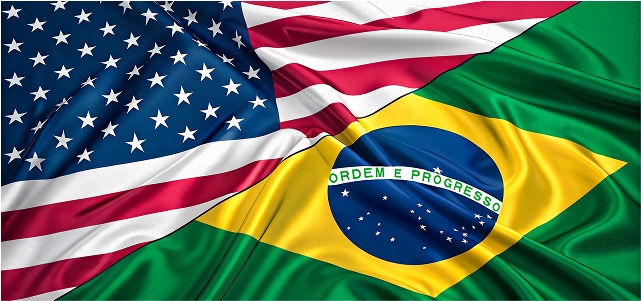Orlando Sports
Cultural Sports From Brasil to USA
The Florida Cup
The Florida Cup, launched in 2015, is organized and administered by 2SV Sports and Entertainment, with Ricardo Villar as its CEO and co-founder. Villar, a Brazilian native and former professional footballer, has led the tournament’s operations, including team selection, venue coordination, and fan engagement, as noted in sources like the Florida Cup’s official site and Greater Orlando Sports’ partner listings.
The Greater Orlando Sports Commission (GO Sports), a nonprofit founded in 1993 to drive sports tourism in Orlando, Lake, Orange, Osceola, and Seminole counties, does not administer the Florida Cup. Instead, GO Sports acts as a regional partner, providing logistical support, venue coordination, and promotional assistance for major sports events in Orlando, including the Florida Cup. For example:
– GO Sports lists the Florida Cup among its supported events, alongside the MLS All-Star Game and Copa América, indicating collaboration rather than direct administration.
– The commission works with partners like Orlando City SC and Inter&Co Stadium (key Florida Cup venues), facilitating infrastructure and community engagement.
– GO Sports’ role includes marketing Orlando as a sports destination, which benefits events like the Florida Cup by attracting international teams and fans, including Brazilian clubs like Flamengo and Corinthians.
Soccer Spotlight and Community Support (2016–2024)

Under President and CEO Jason Siegel since 2016, the Greater Orlando Sports Commission has solidified Orlando’s status as a global sports destination, hosting over 430 events with a projected $2.2 billion economic impact by 2024. While GO Sports does not administer the Florida Cup, it plays a vital supporting role, collaborating with organizers like Ricardo Villar, the tournament’s Brazilian CEO and co-founder. Villar, a São Paulo native and former MLS player, launched the Florida Cup in 2015 through 2SV Sports, bringing Brazilian clubs like Atlético Mineiro (2016 champions), São Paulo (2017), and Flamengo (2019) to Orlando. GO Sports facilitates these events by coordinating venues like Inter&Co Stadium and promoting Orlando as a soccer hub, drawing thousands of Brazilian-American fans.
The Florida Cup’s Brazilian dominance, with Palmeiras’ 2020 victory, has been a cultural touchstone. “Seeing Corinthians at Camping World Stadium felt like São Paulo,” says Ana Ribeiro, a Brazilian-American fan. GO Sports’ support for soccer extends to Orlando City SC (featuring Kaká, 2015–2017) and Orlando Pride (led by Marta), whose 2024 NWSL Championship electrified Brazilian communities. BrazilAmerica.org’s “Samba & Soccer” events during Florida Cup Fan Fests, featuring samba and player meet-and-greets, amplify this connection, uniting fans across cultures.
Greater Orlando Sports Commission: Building a Soccer Legacy with Brazilian Passion
Creation and Early Years (1993–2015)
Founded in 1993 as the Central Florida Sports Commission, GO Sports is a nonprofit dedicated to attracting sports events to Orlando, Lake, Orange, Osceola, and Seminole counties. Its mission: drive economic development through sports tourism. By 2015, GO Sports had hosted over 1,000 events, generating $1 billion in regional spending. Early efforts included supporting the 1994 FIFA World Cup at the Citrus Bowl, laying the foundation for soccer’s growth in Orlando.
For Brazilian-Americans, these early soccer initiatives were significant. The commission’s work with venues set the stage for Orlando City SC’s MLS entry in 2015, with Brazilian star Kaká as its first Designated Player, igniting passion among local Brazilian fans.
Soccer Spotlight and Community Support (2016–2024)
 Under President and CEO Jason Siegel since 2016, the Greater Orlando Sports Commission has solidified Orlando’s status as a global sports destination, hosting over 430 events with a projected $2.2 billion economic impact by 2024. While GO Sports does not administer the Florida Cup, it plays a vital supporting role, collaborating with organizers like Ricardo Villar, the tournament’s Brazilian CEO and co-founder. Villar, a São Paulo native and former MLS player, launched the Florida Cup in 2015 through 2SV Sports, bringing Brazilian clubs like Atlético Mineiro (2016 champions), São Paulo (2017), and Flamengo (2019) to Orlando. GO Sports facilitates these events by coordinating venues like Inter&Co Stadium and promoting Orlando as a soccer hub, drawing thousands of Brazilian-American fans.
Under President and CEO Jason Siegel since 2016, the Greater Orlando Sports Commission has solidified Orlando’s status as a global sports destination, hosting over 430 events with a projected $2.2 billion economic impact by 2024. While GO Sports does not administer the Florida Cup, it plays a vital supporting role, collaborating with organizers like Ricardo Villar, the tournament’s Brazilian CEO and co-founder. Villar, a São Paulo native and former MLS player, launched the Florida Cup in 2015 through 2SV Sports, bringing Brazilian clubs like Atlético Mineiro (2016 champions), São Paulo (2017), and Flamengo (2019) to Orlando. GO Sports facilitates these events by coordinating venues like Inter&Co Stadium and promoting Orlando as a soccer hub, drawing thousands of Brazilian-American fans.
The Florida Cup’s Brazilian dominance, with Palmeiras’ 2020 victory, has been a cultural touchstone. “Seeing Corinthians at Camping World Stadium felt like São Paulo,” says Ana Ribeiro, a Brazilian-American fan. GO Sports’ support for soccer extends to Orlando City SC (featuring Kaká, 2015–2017) and Orlando Pride (led by Marta), whose 2024 NWSL Championship electrified Brazilian communities. BrazilAmerica.org’s “Samba & Soccer” events during Florida Cup Fan Fests, featuring samba and player meet-and-greets, amplify this connection, uniting fans across cultures.
New Administration in 2025: A Bold Vision
In January 2025, GO Sports unveiled a strengthened leadership team to elevate Orlando’s sports profile. The Board of Directors grew to 137 members, with 31 new additions, including sports leaders like Adam Ball (ESPN Wide World of Sports) and Ultima Espino (Orlando Health). Caesar Lopez, Chief Operating Officer and General Counsel for Orlando City SC and Orlando Pride, became Board Chairman, succeeding Sharon Line Clary. Lopez’s soccer expertise, tied to MLS and international events, signals a continued focus on soccer. Staff promotions included Jennifer Lastik as Chief Operating Officer, named a 2024 Sports Business Journal Game Changer, and Brent Nelson as Executive Vice President, with over $3.6 billion in event impact since 1995. New hire Jordan Henderson joined as Corporate Partnerships and Events Coordinator.
“As Chairman, I’m excited to lead our diverse board,” Lopez said. “Soccer events like the Florida Cup and FIFA Club World Cup will showcase Orlando’s global appeal.” This new administration enhances GO Sports’ ability to support soccer, resonating with Brazilian-American fans.
New Administration in 2025: A Bold Vision
In January 2025, GO Sports unveiled a strengthened leadership team to elevate Orlando’s sports profile. The Board of Directors grew to 137 members, with 31 new additions, including sports leaders like Adam Ball (ESPN Wide World of Sports) and Ultima Espino (Orlando Health). Caesar Lopez, Chief Operating Officer and General Counsel for Orlando City SC and Orlando Pride, became Board Chairman, succeeding Sharon Line Clary. Lopez’s soccer expertise, tied to MLS and international events, signals a continued focus on soccer. Staff promotions included Jennifer Lastik as Chief Operating Officer, named a 2024 Sports Business Journal Game Changer, and Brent Nelson as Executive Vice President, with over $3.6 billion in event impact since 1995. New hire Jordan Henderson joined as Corporate Partnerships and Events Coordinator.
“As Chairman, I’m excited to lead our diverse board,” Lopez said. “Soccer events like the Florida Cup and FIFA Club World Cup will showcase Orlando’s global appeal.” This new administration enhances GO Sports’ ability to support soccer, resonating with Brazilian-American fans.
Brazilian-American Connection and Cultural Impact
GO Sports’ soccer initiatives have forged deep ties with Brazilian-American communities. By supporting Orlando City SC (Kaká’s 25 MLS goals) and Orlando Pride (Marta’s 38 NWSL goals), the commission has made Inter&Co Stadium a cultural hub. The Florida Cup, led by Ricardo Villar, has featured over 20 Brazilian clubs since 2015, from São Paulo’s 2017 title to Palmeiras’ 2020 win. GO Sports’ logistical support ensures these events thrive, drawing Brazilian fans to venues like Camping World Stadium.
BrazilAmerica.org’s events, like soccer clinics and watch parties, celebrate this heritage. “The Florida Cup and Marta’s Pride games bring our community together,” says Mariana Costa, a BrazilAmerica volunteer. GO Sports’ backing of Lions Pride Jr., a 2025 youth soccer program, inspires Brazilian-American kids, many dreaming of emulating Marta or Neymar.
Looking Ahead: 2025 and Beyond
In 2025, GO Sports will host the FIFA Club World Cup at Inter&Co Stadium, FHSAA Softball State Championships, and bids for WrestleMania 2031, aiming for $3 billion in future impact. Brazilian-American fans anticipate a potential Florida Cup return, with X posts speculating about Flamengo or Corinthians. BrazilAmerica.org invites our community to join Orlando City SC and Orlando Pride matches, engage with Lions Pride Jr., and follow @GreaterOrlandoSC on X. Visit greaterorlandosports.com for updates. Obrigado to GO Sports, Ricardo Villar, and our fans for making Orlando a home for Brazilian passion. Vamos torcer juntos!
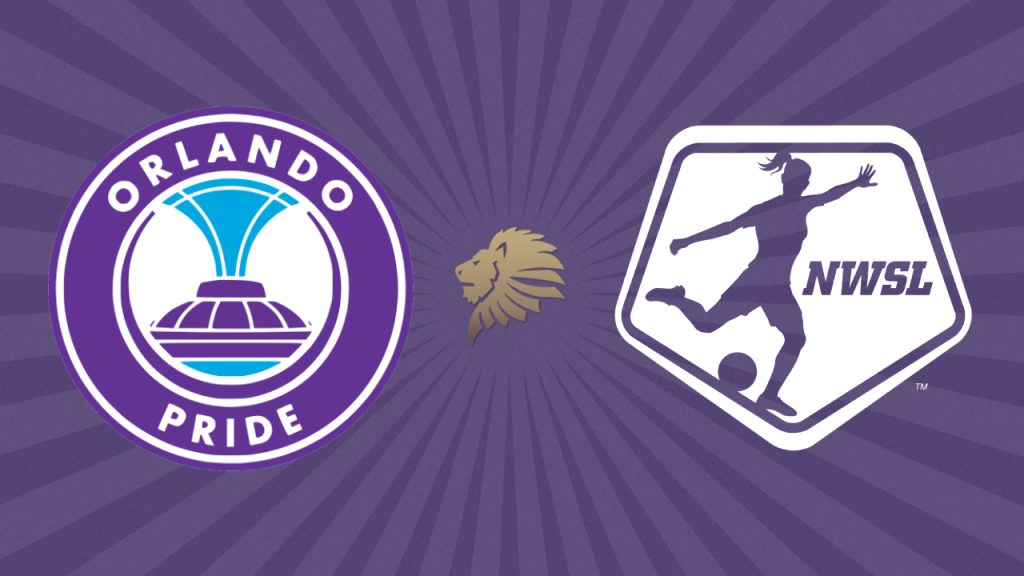
Purple Pride: Orlando City SC, Orlando Pride, and the Brazilian Spirit
At BrazilAmerica.org, we celebrate the vibrant ties between Brazil and the Americas, where culture, community, and passion converge. In Orlando, Florida, soccer is more than a game—it’s a bridge uniting diverse communities, with the Brazilian spirit at its heart. Orlando City Soccer Club (OCSC) and Orlando Pride, the city’s Major League Soccer (MLS) and National Women’s Soccer League (NWSL) teams, embody this unity. From the legendary Marta to the legacy of Kaká, these clubs showcase Brazilian excellence while fostering pride among Brazilian-American fans. Join us as we explore their journey, achievements, and the cultural heartbeat they bring to Central Florida.
Orlando City SC: The Lions’ Brazilian Legacy
Founded in 2010 and joining MLS in 2015, Orlando City SC, known as the Lions, has transformed Central Florida into a soccer hub. Playing at the 25,500-seat Inter&Co Stadium in downtown Orlando, the club’s purple and gold colors ignite passion among fans, including a vibrant Brazilian-American community. The Lions’ story began in the United Soccer League (USL), where they won titles in 2011 and 2013, before ascending to MLS as its 21st franchise under the ownership of the Wilf family since 2021.
For Brazilian-Americans, Orlando City’s connection runs deep through Ricardo Kaká, the 2007 Ballon d’Or winner who became the club’s first Designated Player in 2015. Kaká, a São Paulo native, brought global star power, scoring 25 goals across three MLS seasons and drawing thousands to matches. His flair and humility resonated with Brazilian fans, many of whom saw him as a cultural ambassador. “Kaká made us feel at home,” says Ana Silva, a Brazilian-American fan from Kissimmee. “He showed the world what Brazilian soccer is about—heart and skill.”
The Lions’ pinnacle came in 2022, when they won the U.S. Open Cup, defeating Sacramento Republic 3–0, marking their first major MLS trophy. In 2024, they posted a 9–9–16 record, reaching the playoffs, and in 2025, their 11th MLS season kicked off on February 22 with a match against the Philadelphia Union. This June, Inter&Co Stadium will host FIFA Club World Cup matches, placing Orlando on the global stage. With players like Uruguay’s Facundo Torres leading the attack and coach Oscar Pareja’s steady guidance, the Lions aim for an MLS Cup run, inspiring Brazilian-American fans to rally behind the purple.
Orlando Pride: Marta’s Reign and Historic Triumph
Launched in 2015 and beginning NWSL play in 2016, the Orlando Pride share Inter&Co Stadium and the Wilf family’s ownership with Orlando City. The Pride’s blue and purple crest symbolizes resilience, and no player embodies this more than Marta Vieira da Silva, the Brazilian legend known as the “Queen of Soccer.” A six-time FIFA World Player of the Year, Marta joined the Pride in 2017 and has since become the NWSL’s all-time leading scorer with 38 goals. Her leadership, alongside fellow Brazilians Adriana and Debinha, has made the Pride a beacon for Brazilian-American fans.
In 2024, the Pride achieved a historic milestone, becoming Orlando’s first major professional sports team to win a league championship. Under coach Seb Hines and general manager Haley Carter, they clinched the NWSL Shield with a 24-game unbeaten streak, finishing the regular season at 17–1–6. Their crowning moment came in the NWSL Championship, defeating the Washington Spirit 2–0, with Zambian star Barbra Banda and Marta driving the attack. “This is for Orlando, for Brazil, for every fan who believed,” Marta said post-match, her words echoing in Brazilian communities across Florida.
The Pride’s 2025 season began with a statement: a 6–0 rout of the Chicago Stars, signaling their intent to defend their title. Key matches against the Kansas City Current (May 16) and Gotham FC (August 29) will draw massive crowds, with Brazilian flags waving in “The Wall” supporters’ section. For fans like João Mendes, a Brazilian-American season ticket holder, Marta’s impact transcends the pitch: “She’s our hero. She shows young girls in our community they can achieve anything.”

Uniting Communities Through Soccer
Orlando’s soccer clubs are more than teams—they’re cultural connectors for Brazilian-Americans. Kaká’s legacy and Marta’s ongoing brilliance have drawn Brazilian fans to Inter&Co Stadium, where samba beats mix with chants in “The Wall.” The clubs’ rosters have featured other Brazilian talents, like Adriana and Debinha, who’ve added flair and goals to the Pride’s attack. These players inspire Brazilian-American youth, many of whom participate in Lions Pride Jr., a 2025 youth soccer program with the YMCA offering clinics in neighborhoods with strong Brazilian populations, such as Hunters Creek and Dr. Phillips.
BrazilAmerica.org has partnered with local initiatives to amplify this connection, hosting watch parties and cultural events that celebrate Brazilian heritage. During the clubs’ annual Turkey Distribution, Brazilian-American volunteers join players to serve families, blending soccer with community service. The Pride’s state-of-the-art training facility in Kissimmee, the first exclusive NWSL training ground, hosts open practices where Brazilian fans meet players, strengthening ties. “Soccer brings us together,” says Maria Costa, a BrazilAmerica volunteer. “Whether you’re from São Paulo or Orlando, we’re one family here.”
Bright Future in 2025
As 2025 unfolds, Orlando City and the Pride are poised to elevate their legacy. The Lions, with key matches against Inter Miami (May 24) and LAFC (July 5), aim for a deep MLS Cup playoff run, building on their 2024 postseason berth. The Pride, defending NWSL champions, are driven by Marta’s vision and Banda’s firepower, targeting a repeat title. Both clubs share a goal: to make Orlando a soccer capital, with Brazilian-American fans at the core.
For BrazilAmerica.org, this is a moment to celebrate. We invite our community to join the purple passion at Inter&Co Stadium, where events like Pups of Pride night and Fan Appreciation Night (November 2) create unforgettable memories. Tickets are available at orlandocitysc.com, with LionNation memberships offering exclusive perks. Can’t attend? Watch on MLS Season Pass (Apple TV) or FOX Sports, and follow @OrlandoCitySC and @ORLPride on X for updates.
Vamos Orlando!
From Kaká’s magic to Marta’s reign, Orlando City SC and Orlando Pride embody the Brazilian spirit—passion, resilience, and joy. They unite Brazilian-Americans with fans of all backgrounds, proving soccer’s power to bridge cultures. As BrazilAmerica.org champions this connection, we say: Vamos Orlando! Join us in cheering for the Lions and Pride, and let’s make 2025 a year of purple pride.
*For tickets, schedules, and more, visit www.orlandocitysc.com. Share your soccer stories with us at BrazilAmerica.org!*
Osceola Magic
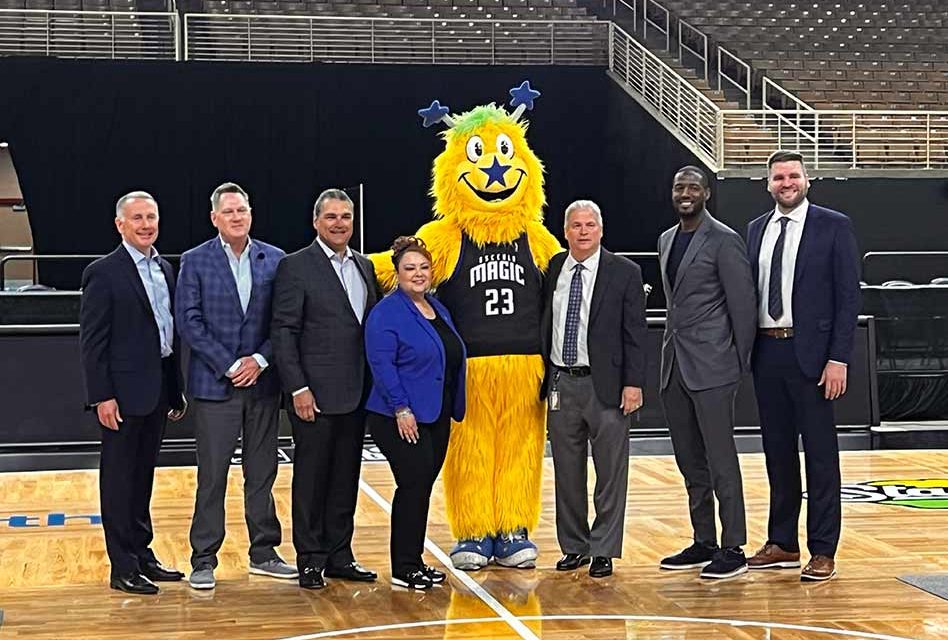
The Osceola Magic, the NBA G League affiliate of the Orlando Magic, have a rich history rooted in their evolution from the Erie BayHawks to their current home in Kissimmee, Florida. As a developmental team, they play a critical role in nurturing talent for the NBA, with a track record of championships and standout performances. Below is an overview of their history, key milestones, and recent performance as of April 20, 2025.
History and Evolution
– Origins as Erie BayHawks (2008–2017): The franchise began as an expansion team in the NBA Development League (D-League) in 2008, based in Erie, Pennsylvania. Initially affiliated with the Cleveland Cavaliers and Philadelphia 76ers, the team later partnered with the New York Knicks (2011–2014). Notable moments include Jeremy Lin’s triple-double (28 points, 11 rebounds, 12 assists) in 2012 and Amar’e Stoudemire’s injury rehab assignment that same year. The “BayHawks” name referenced Erie’s Presque Isle Bay.
– Relocation to Lakeland (2017–2023): In 2016, the Orlando Magic purchased the BayHawks and announced plans to relocate the franchise to Florida, choosing Lakeland after evaluating multiple cities, including Kissimmee and Jacksonville. The team, rebranded as the Lakeland Magic, began play in the 2017–18 season at the RP Funding Center, becoming the 17th NBA-owned G League team. The league rebranded from D-League to NBA G League in 2017, sponsored by Gatorade.
– Move to Kissimmee and Rebranding (2023–Present): On April 11, 2023, the Orlando Magic announced the team’s relocation to Kissimmee, closer to Orlando, renaming it the Osceola Magic. The team now plays at the Silver Spurs Arena in Osceola Heritage Park, enhancing proximity to the parent club’s facilities. The move was described as a “game changer” for operational efficiency and fan engagement.
Key Milestones
– 2021 Championship: As the Lakeland Magic, the team won the NBA G League championship in the COVID-19-shortened 2020–21 season, defeating the Delaware Blue Coats. Head coach Stan Heath earned Coach of the Year honors before joining Eastern Michigan, with Joe Barrer taking over as head coach.
– Leadership Changes: In October 2021, Anthony Parker was promoted to assistant general manager for the Orlando Magic, and Adetunji Adedipe became the Osceola Magic’s general manager after serving as an assistant. Dylan Murphy, a former Orlando Magic analyst and assistant, was named head coach in July 2023 and has led the team to recent success.
– Notable Alumni: The franchise has been a proving ground for players like Jeremy Lin, Mac McClung (three-time NBA Dunk Contest champion), and Trevelin Queen, with many earning NBA call-ups.
Recent Performance (2024–25 Season)
-Regular Season and Playoff Run: Under coach Dylan Murphy, the Osceola Magic posted a 22–12 record in the 2024–25 regular season, earning the Eastern Conference’s No. 1 seed for the second consecutive year. They led the G League in scoring and won 13 of their last 16 games heading into the playoffs. The team advanced to the NBA G League Finals, defeating the Indiana Mad Ants (129–114) and Maine Celtics (135–122, series 2–1) in the Eastern Conference playoffs.
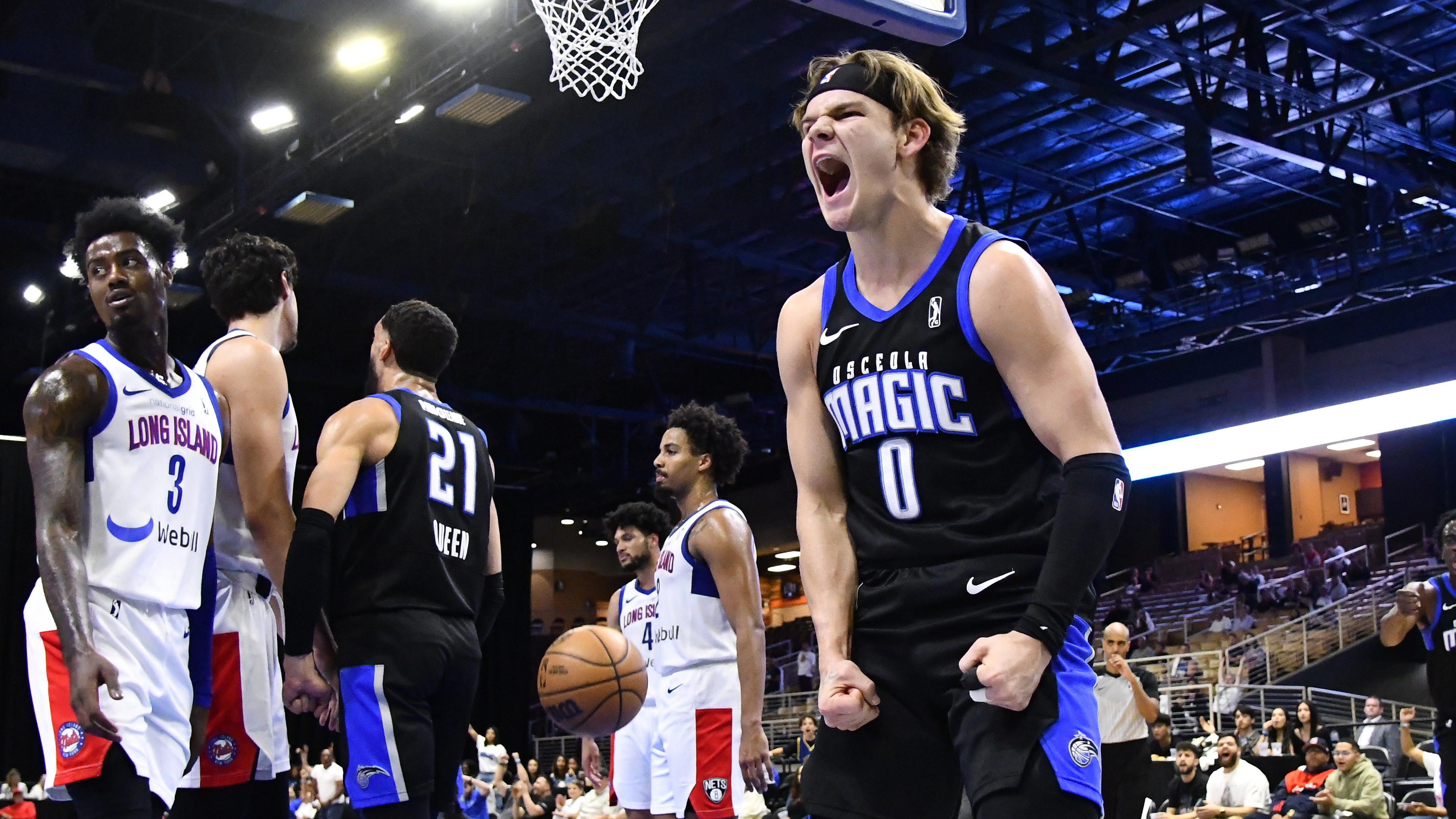)
– 2025 G League Finals: The Osceola Magic faced the Stockton Kings in a best-of-three Finals series, marking their second Finals appearance (first as Osceola Magic). They won Game 1 (129–118) on April 9, 2025, led by Myron Gardner (30 points) and Mac McClung (29 points, 7 assists). However, they lost Game 2 (144–126) on April 12 and fell in Game 3 (score unavailable, but Stockton won the series). Despite the loss, the team’s high-octane offense and home crowd support (3,421 fans at Game 3, near sellout) were highlights.
– Standout Players:
– Mac McClung: Named 2023–24 G League MVP and 2024–25 Player of the Month, McClung set a franchise playoff record with 42 points against Maine, including 20 in one quarter. He averaged 23 points per game, with a franchise-record 46 points in an overtime win on March 28, 2025.
– Queen: A two-way contract player, Queen earned Player of the Week honors and averaged 22.7 points per game.
– Ethan Thompson: Contributed 17.8 points per game and 20 points in the Finals-clinching win, earning praise for his two-way play. https://www.proballers.com/basketball/team/3204/osceola-magic
– Myron Gardner and Colin Castleton: Gardner (17 points, 11 rebounds in the Finals) and Castleton (10.6 rebounds per game) provided crucial support.
– Team Stats: The Magic’s offense was powered by McClung (5.3 assists), Queen (5.1 assists), and Javonte Smart (3.8 assists), with Castleton and Jalen Slawson anchoring rebounds. They dominated at home, leveraging the Silver Spurs Arena’s electric atmosphere.
Current Season Structure
Schedule: The 2024–25 season began with a 16-game Tip-Off Tournament (November 8–December 22, 2024), culminating in the Winter Showcase in Orlando, followed by a 34-game regular season (December 27, 2024–March 29, 2025). The season opened against the Austin Spurs on November 8, 2024.
– Roster and Two-Way Players: The 12-player roster, announced November 6, 2024, featured two-way guards McClung and Queen, alongside Alex Morales, Jalen Slawson, and Javonte Smart. Orlando Magic players like Caleb Houstan were assigned for development, with Houstan scoring 23 points in a December 2024 game.
– Community Engagement: The Osceola Magic hosted a toy drive, holiday shopping sprees with the Boys & Girls Club, and jersey auctions for charity, reflecting strong community ties.
Legacy and Outlook
The Osceola Magic have established themselves as a G League powerhouse, with two Finals appearances (2021, 2025) and a championship in 2021. Their proximity to Orlando facilitates player development, as seen with McClung and Queen’s two-way contracts and Houstan’s assignments. Despite falling short in the 2025 Finals, the team’s 22–12 record, top seed, and league-leading scoring under Murphy’s leadership signal a bright future. The passionate fanbase at Silver Spurs Arena, nearly selling out playoff games, underscores growing local support.
Orlando Magic
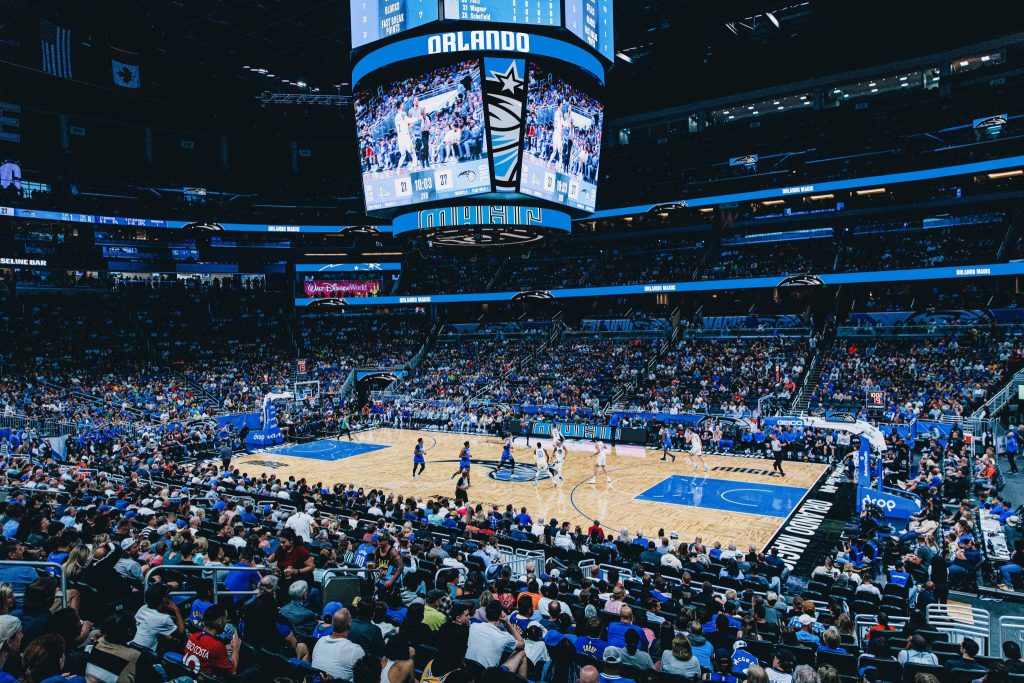
The Orlando Magic, established in 1989 as an NBA expansion franchise, have carved a notable path in professional basketball, marked by rapid rises, star-studded rosters, and persistent challenges in securing a championship. Based in Orlando, Florida, the team competes in the Southeast Division of the Eastern Conference. Their name, inspired by the nearby Walt Disney World’s Magic Kingdom, reflects the city’s entertainment identity. Despite never winning an NBA title, the Magic have reached the NBA Finals twice (1995, 2009), won eight division titles, and made 18 playoff appearances in 36 seasons as of 2025.
Early Years and Foundation (1985–1992)
The Magic’s origins trace to 1985, when Orlando businessman Jim L. Hewitt pitched the idea of an NBA team to Pat Williams, then-general manager of the Philadelphia 76ers. Williams, intrigued, led the investment group, and in April 1987, the NBA awarded Orlando a franchise for a reported $32.5 million expansion fee, alongside the Miami Heat, Charlotte Hornets, and Minnesota Timberwolves. A fan contest named the team “Magic,” beating out “Heat,” “Tropics,” and “Juice.” The franchise hired Matt Guokas as its first coach and selected Nick Anderson as its inaugural draft pick in 1989. The early years were tough, with the Magic posting an 18–64 record in their debut 1989–90 season. However, a surprising preseason win over the reigning champion Detroit Pistons in 1989 signaled potential. The 1990–91 season saw improvement, with Scott Skiles setting an NBA single-game assists record (30) and earning Most Improved Player honors, while rookie Dennis Scott set a team record for three-pointers. In 1991, the DeVos family, founders of Amway, purchased the franchise for $85 million, with Richard DeVos as owner.
Shaq and Penny Era: Rapid Ascent (1992–1996)
The Magic’s fortunes shifted dramatically in 1992 when they won the draft lottery and selected Shaquille O’Neal, a 7-foot-1 center from LSU. O’Neal, a generational talent, led the team to a 41–41 record in 1992–93, narrowly missing the playoffs. Named an All-Star, he became a cornerstone. In 1993, the Magic won the draft lottery again, selecting Chris Webber but trading him for Anfernee “Penny” Hardaway and future picks. The Shaq-Penny duo propelled the Magic to their first playoff berth in 1993–94, finishing with a 50–32 record, though they were swept by the Indiana Pacers. In 1994–95, bolstered by free agent Horace Grant, the Magic posted a 57–25 record, won the Atlantic Division, and became the second-fastest team to reach the NBA Finals (in their sixth season). They defeated Michael Jordan’s Chicago Bulls in the playoffs but were swept by the Houston Rockets in the Finals. The 1995–96 season saw a franchise-best 60–22 record, but injuries and a loss to the Bulls in the Eastern Conference Finals halted their momentum. O’Neal’s departure to the Los Angeles Lakers in 1996, after signing a record-breaking free-agent contract, marked a significant blow
Post-Shaq Struggles and Rebuilding (1996–2004)
Without O’Neal, the Magic leaned on Hardaway, but injuries plagued him, leading to his trade in 1999. The late 1990s saw flashes of success, including a 33–17 record in the lockout-shortened 1998–99 season, led by Darrell Armstrong’s emotional leadership and awards for Sixth Man and Most Improved Player. The early 2000s brought new talent, with Tracy McGrady signing in 2000. McGrady, a scoring phenom, won NBA scoring titles in 2003 and 2004, averaging 28.1 points per game with Orlando, the highest in franchise history. Despite his brilliance, the Magic struggled with depth, posting a league-worst 21–61 record in 2003–04. McGrady was traded to Houston in 2004.
Dwight Howard Era: Resurgence (2004–2012)
The 2004 draft lottery win brought Dwight Howard, a high-school center who became the Magic’s next cornerstone. Howard’s defensive dominance—earning three consecutive Defensive Player of the Year awards—and efficient scoring led a turnaround. By 2007–08, the Magic reached the playoffs, and in 2008–09, with Hedo Turkoglu and Rashard Lewis, they posted 59 wins and returned to the NBA Finals, losing to the Lakers in five games. The 2009–10 season saw another strong campaign (59–23) but a loss to the Boston Celtics in the Eastern Conference Finals. Howard’s trade request in 2011–12 and eventual move to the Lakers in 2012 triggered another rebuild, with the Magic posting a league-worst 20–62 record in 2012–13.
Rebuilding and Recent Years (2012–2025)
The post-Howard era was challenging, with five consecutive last-place divisional finishes from 2013 to 2018. Nikola Vucevic emerged as a key player, and under coach Steve Clifford, the Magic won a surprising division title in 2018–19, returning to the playoffs. The 2019–20 season saw another playoff appearance, but injuries and trades in 2020–21 led to a 21–51 record. Under new coach Jamahl Mosley, the Magic began rebuilding around young talent like Paolo Banchero, the 2022 first-overall pick. Banchero joined Shaquille O’Neal and Tracy McGrady as the only Magic players to average 25+ points per game in a season. In 2023–24, the Magic reached the playoffs, losing to the Cleveland Cavaliers. In 2024–25, led by Banchero and Franz Wagner, they secured the seventh seed via the Play-In Tournament, defeating the Atlanta Hawks 120–95, and faced the Boston Celtics in the first round. As of April 20, 2025, the Magic’s regular-season record stands at 41–41, with a strong defensive identity (allowing a league-low 105.5 points per game).
Legacy and Notable Players
The Magic’s history is defined by star power—Shaquille O’Neal, Penny Hardaway, Tracy McGrady, Dwight Howard, and Nick Anderson, the franchise’s second all-time leading scorer, all left indelible marks. Anderson’s steal against Michael Jordan in 1995 and McGrady’s 62-point game in 2004 remain iconic. The team’s Amway Center (opened 2010) and mascot, Stuff the Magic Dragon, enhance its vibrant fan experience. Despite no championships, the Magic’s two Finals appearances and eight division titles make them the second-most successful of the 1988–89 expansion teams, behind the Miami Heat.
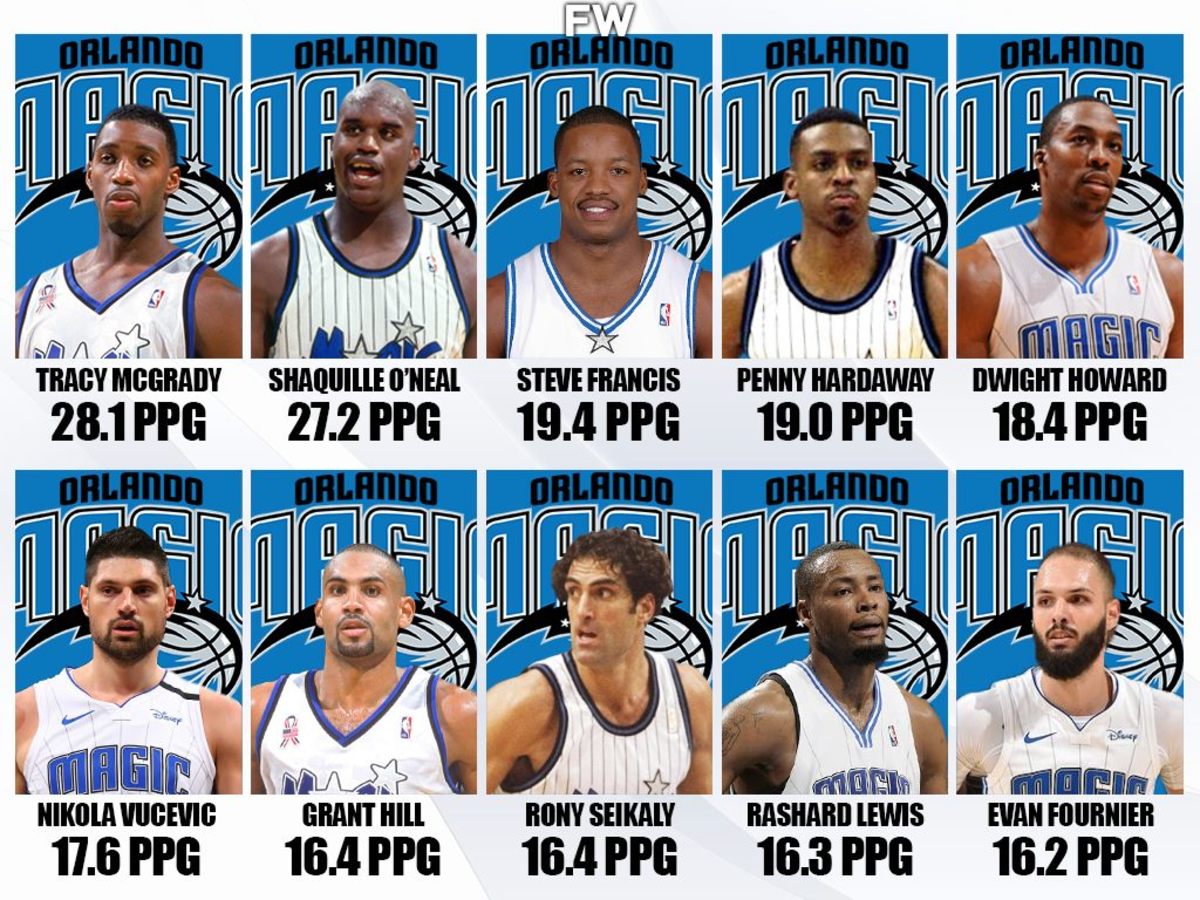
Current Outlook
With a young core led by Banchero and Wagner, and a focus on defensive tenacity under Mosley, the Magic are poised for growth. Their challenge remains overcoming top Eastern Conference teams like the Celtics. The franchise’s history of quick turnarounds—evident in the Shaq and Howard eras—suggests potential for future success, though consistency and health will be key.
For further details, check the Orlando Magic’s official site (nba.com/magic) or historical records on Basketball-Reference.com.

